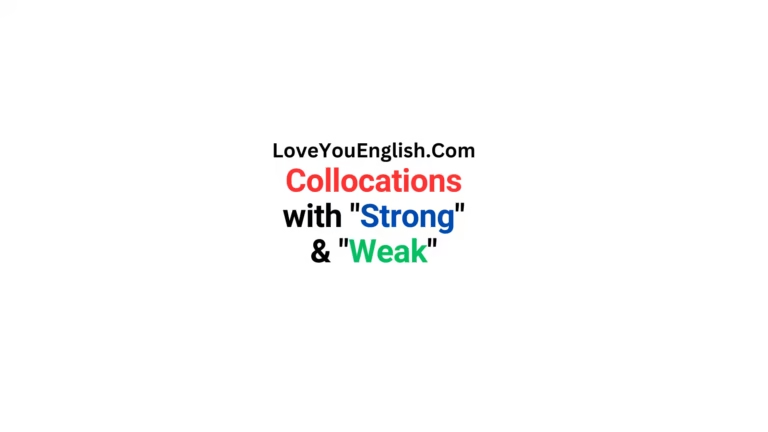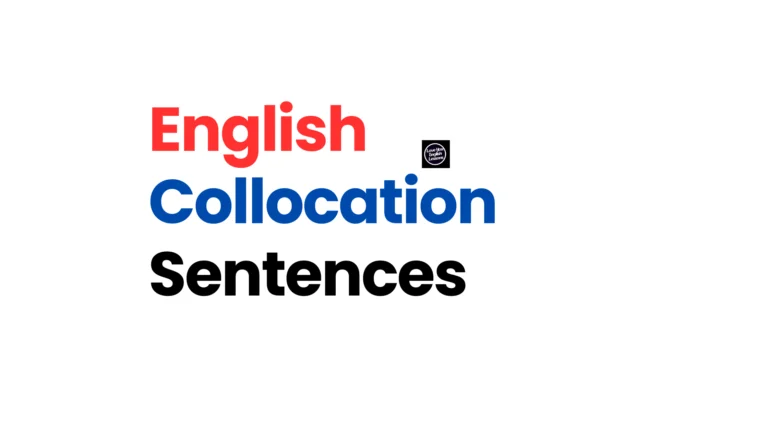English Collocations with Meanings and Examples
English collocations are combinations of words that are often used together in a way that sounds natural to native speakers.
Learning collocations is essential for improving your fluency and making your English sound more natural.
In this post, I’ll teach what collocations are, why they’re important, and provide examples of common collocations with their meanings and simple sentences.
What Are Collocations?
Collocations are groups of two or more words that are frequently used together. They can be combinations of:
- Verb + Noun (e.g., make a decision)
- Adjective + Noun (e.g., strong coffee)
- Adverb + Adjective (e.g., deeply concerned)
- Verb + Adverb (e.g., speak fluently)
These word pairings feel “right” to native speakers. Using the wrong combination, even if grammatically correct, can sound unnatural.
Why Are Collocations Important?
- Sound Natural: Using collocations makes your English more like a native speaker’s.
- Improve Fluency: They help you speak and write more quickly without overthinking.
- Boost Confidence: Correct collocations show your understanding of English.
Types of Collocations
1. Verb + Noun
These are very common and involve a verb followed by a noun.
| Collocation | Meaning | Example Sentence |
|---|---|---|
| Make a decision | Decide something | I need to make a decision soon. |
| Take a break | Rest for a while | Let’s take a break after lunch. |
| Do homework | Complete homework tasks | She always does her homework early. |
| Give advice | Offer guidance | Can you give me some advice? |
| Pay attention | Focus on something | Please pay attention to the teacher. |
2. Adjective + Noun
This combination links a describing word (adjective) with a noun.
| Collocation | Meaning | Example Sentence |
|---|---|---|
| Heavy rain | Strong, intense rain | We stayed indoors because of heavy rain. |
| Strong coffee | Coffee with a bold flavor | I need a cup of strong coffee to wake up. |
| Bright idea | A clever or smart idea | That’s a bright idea for the project. |
| Deep sleep | Restful, uninterrupted sleep | He fell into a deep sleep after dinner. |
| High hopes | Great expectations | She has high hopes for her career. |
3. Adverb + Adjective
In this type, an adverb strengthens the meaning of an adjective.
| Collocation | Meaning | Example Sentence |
|---|---|---|
| Fully aware | Completely understanding | I am fully aware of the risks. |
| Deeply concerned | Very worried | She is deeply concerned about her son. |
| Highly unlikely | Very improbable | It’s highly unlikely to rain today. |
| Strongly recommended | Highly suggested | This book is strongly recommended. |
| Bitterly disappointed | Very upset | He was bitterly disappointed by the results. |
4. Verb + Adverb
These pairings combine a verb and an adverb to describe an action.
| Collocation | Meaning | Example Sentence |
|---|---|---|
| Speak fluently | Talk without difficulty | She speaks English fluently. |
| Whisper softly | Speak in a low, quiet voice | He whispered softly into her ear. |
| Apologize sincerely | Say sorry with genuine feeling | I apologize sincerely for my mistake. |
| Laugh loudly | Laugh in a noisy way | They laughed loudly at the joke. |
| Work hard | Put in great effort | He works hard to achieve his goals. |
Common Collocations in Daily Life
Collocations with “Make”
- Make a mistake (do something wrong): Don’t worry if you make a mistake.
- Make a difference (create an impact): Volunteering can make a difference.
- Make friends (form relationships): She finds it easy to make friends.
Collocations with “Take”
- Take care (look after): Please take care of yourself.
- Take responsibility (accept blame or duty): He took responsibility for the error.
- Take notes (write down information): I always take notes during lectures.
Collocations with “Do”
- Do the dishes (wash the plates): I’ll do the dishes after dinner.
- Do business (engage in trade): We do business with companies worldwide.
- Do someone a favor (help someone): Can you do me a favor?
Collocations with “Have”
- Have a party (host an event): We’re having a party this weekend.
- Have fun (enjoy yourself): The kids had fun at the park.
- Have an idea (think of something): I have an idea for the project.
Tips for Learning Collocations
- Read Regularly: Read books, articles, or blogs to notice how words naturally combine.
- Use a Collocations Dictionary: Online resources like the Oxford Collocations Dictionary can help.
- Practice Writing: Write sentences using new collocations you learn.
- Listen and Repeat: Listen to native speakers and repeat their phrases to understand natural usage.
- Group by Topics: Learn collocations related to themes like work, travel, or food.
Practice Exercise
Fill in the blanks with the correct collocation from the options provided:
- It’s important to ______ attention in class.
(a) take
(b) pay
(c) make - She was ______ disappointed when her application was rejected.
(a) highly
(b) bitterly
(c) deeply - I need to ______ a break after working all day.
(a) have
(b) take
(c) do
Answers:
- (b) pay
- (b) bitterly
- (b) take
Why Native Speakers Love Collocations
Native speakers don’t think about grammar rules when they speak—they use chunks of language automatically.
When you learn collocations, you reduce hesitation and communicate naturally.
For example:
- Saying “fast food” instead of “quick food” is the correct collocation.
- Saying “heavy rain” instead of “strong rain” sounds more natural.
Common Mistakes to Avoid
- Don’t directly translate collocations from your native language. For instance, in English, we say “make a decision,” not “do a decision.”
- Avoid mixing words that don’t belong together. For example, “strong tea” is correct, but “powerful tea” is not.
Conclusion
Learning collocations is a powerful way to improve your English fluency and confidence.
Start with the examples provided in this blog, practice using them in sentences, and gradually expand your knowledge.
Remember, collocations are about patterns, so the more you expose yourself to English, the more natural they will become.
Happy learning!
Read more:
- 100 Sentences for Talking About Feelings
- 50 Conjunction Example Sentences in English
- 100 Common English Questions and Answers
- 70 English Sentences About Alaska
- 70 English Sentences About A Village








